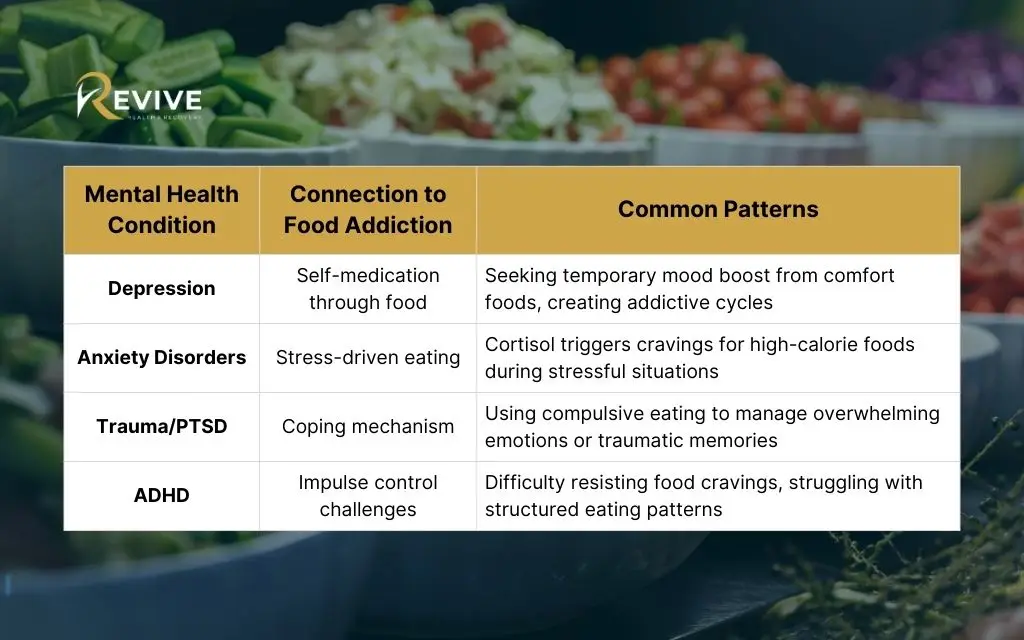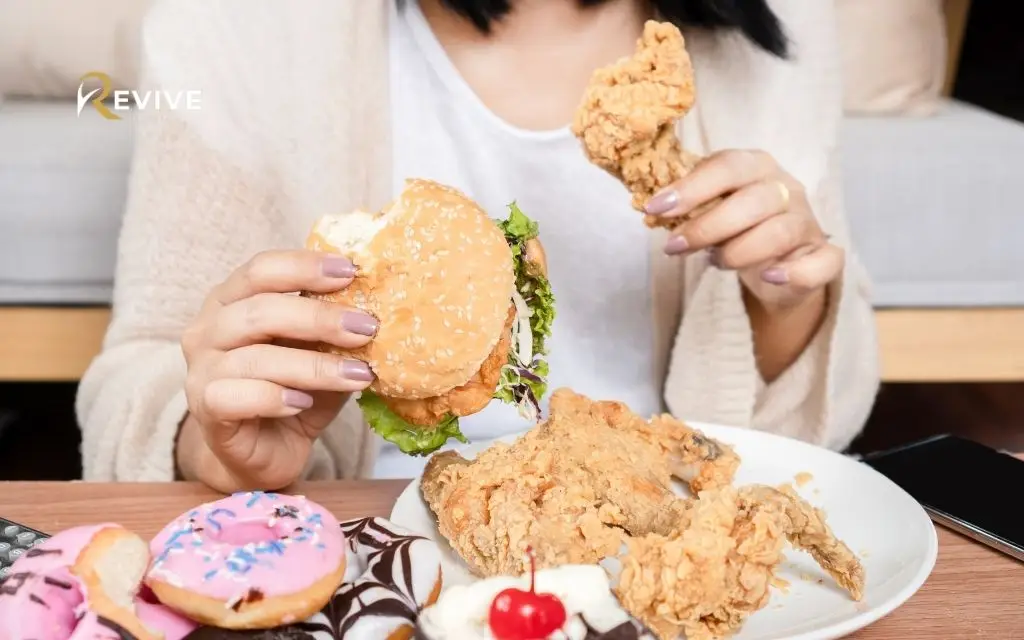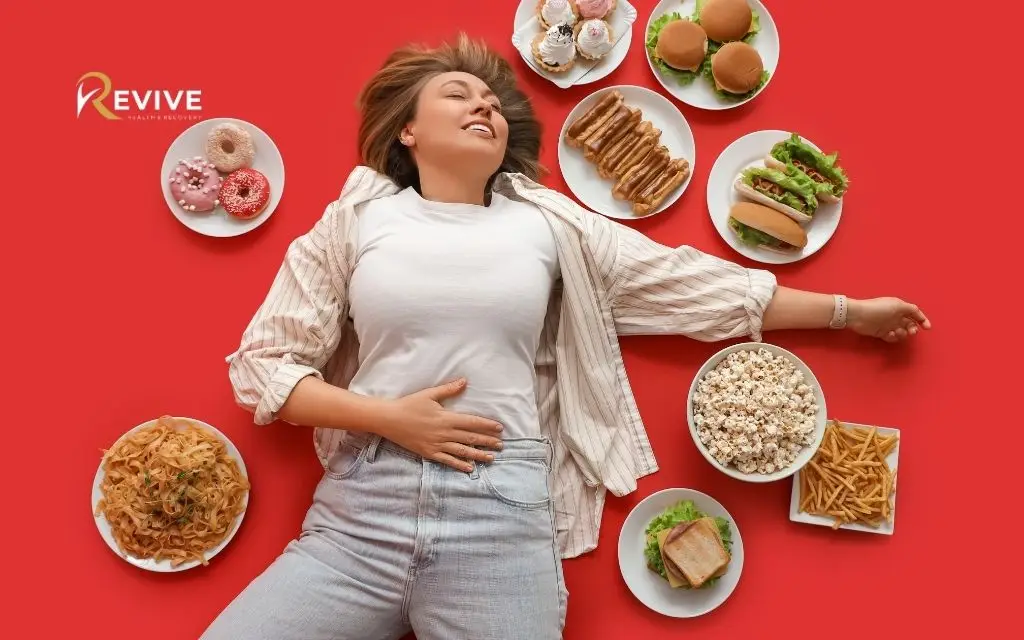Did you know that food addiction affects approximately 14% of adults globally, yet most people struggle in silence, believing it’s simply a matter of willpower? Food addiction represents a complex behavioral addiction that activates the same brain reward circuits as substances like drugs and alcohol, particularly targeting the mesolimbic dopamine system. Unlike other addictions, overcoming food addiction presents unique challenges because complete abstinence from food isn’t possible.
At Revive Health Recovery in Denver, we understand that food addiction often intertwines with mental health conditions like depression, anxiety, and trauma. This creates dual diagnosis presentations that require specialized, integrated treatment approaches. Our comprehensive guide explores evidence-based strategies for food addiction recovery, including mindful eating techniques and therapeutic interventions specifically designed for co-occurring food disorders.
You’ll discover practical tools for recognizing addiction patterns, proven treatment methods, and local Denver resources that can support your journey toward balanced recovery. Ready to break free from compulsive eating cycles? Let’s explore your path to lasting wellness.
Recognizing food addiction signs and mental health connections
Understanding the neuroscience behind compulsive eating
Food addiction shares remarkable similarities with substance addictions at the neurological level. Research shows that ultra-processed foods high in sugar, fat, and salt trigger dopamine releases in your brain’s reward center. Over time, this creates tolerance, meaning you need more food to achieve the same satisfaction level.

The Yale Food Addiction Scale measures 11 addiction-like criteria that help identify problematic eating patterns. These include loss of control, continued consumption despite negative consequences, and withdrawal-like experiences when certain foods aren’t available. Does this sound familiar in your relationship with food?
Identifying food addiction warning signs
| Sign Category | What to Look For | Examples |
| Behavioral Signs | Loss of control around food | Eating rapidly, consuming food until uncomfortably full, eating alone due to shame |
| Physical Signs | Body’s response to eating patterns | Tolerance to certain foods, withdrawal-like irritability when avoiding trigger foods |
| Emotional Signs | Psychological impact | Guilt, shame, social isolation, distress about eating habits |
Mental health conditions and eating patterns
| Mental Health Condition | Connection to Food Addiction | Common Patterns |
| Depression | Self-medication through food | Seeking temporary mood boost from comfort foods, creating addictive cycles |
| Anxiety Disorders | Stress-driven eating | Cortisol triggers cravings for high-calorie foods during stressful situations |
| Trauma/PTSD | Coping mechanism | Using compulsive eating to manage overwhelming emotions or traumatic memories |
| ADHD | Impulse control challenges | Difficulty resisting food cravings, struggling with structured eating patterns |
This demonstrates why binge eating dual diagnosis treatment requires addressing multiple conditions simultaneously rather than treating food addiction in isolation.

Evidence-based recovery strategies for lasting change
| Treatment Approach | How It Works | Key Benefits |
| Cognitive Behavioral Therapy (CBT-E) | Identifies and restructures thought patterns that trigger compulsive eating | Challenges negative self-talk, builds new neural pathways, creates structured meal plans |
| Mindful Eating Training (MB-EAT) | Teaches present-moment awareness during meals | Distinguishes hunger from emotional triggers, strengthens mind-body connection |
| Integrated Dual Diagnosis Treatment | Addresses food addiction and mental health simultaneously | Better outcomes than treating conditions separately, comprehensive medication management |
Cognitive behavioral therapy approaches
Cognitive Behavioral Therapy Enhanced (CBT-E) specifically targets food addiction by helping you identify and restructure thought patterns that trigger compulsive eating. This therapeutic approach teaches you to recognize the connection between thoughts, emotions, and eating behaviors.
Through CBT techniques, you’ll learn to challenge negative self-talk that often precedes binge episodes. For example, transforming “I already ruined my diet, so I might as well eat everything” into more balanced thinking patterns that support recovery goals.
Behavioral modification techniques include creating structured meal plans, identifying trigger situations, and developing alternative coping strategies. These tools help you build new neural pathways that support healthy eating habits over time.

Mindful eating and awareness practices
Mindfulness-Based Eating Awareness Training (MB-EAT) teaches present-moment awareness during meals. This practice helps you recognize true hunger versus emotional eating triggers. You’ll learn to distinguish between physical satiety signals and psychological urges to continue eating.
Simple mindfulness techniques include eating without distractions, chewing slowly, and paying attention to taste, texture, and satisfaction levels. These practices strengthen the connection between your mind and body’s natural eating cues.
Emotional regulation through mindfulness reduces the intensity of cravings and provides tools for managing difficult emotions without turning to food. Regular mindfulness practice supports long-term addiction counseling food recovery by building resilience against stress-induced eating.
Integrated dual diagnosis treatment benefits
Treating food addiction alongside mental health conditions produces better outcomes than addressing either issue independently. Integrated treatment Denver approaches recognize that co-occurring food disorders require simultaneous attention to both behavioral addiction patterns and underlying psychological conditions.
Medication management considerations include addressing depression, anxiety, or ADHD symptoms that contribute to compulsive eating. However, medication works best when combined with therapy and lifestyle changes rather than as a standalone solution.
Family therapy integration helps address relationship dynamics that may trigger or maintain addictive eating patterns. Your support system plays a crucial role in creating an environment that supports mental health recovery food goals.
Denver resources at Revive Health Recovery
Specialized dual diagnosis expertise
Revive Health Recovery offers comprehensive outpatient programs specifically designed for individuals struggling with food addiction and co-occurring mental health conditions. Our Denver-based team understands that overcoming food addiction requires more than traditional dieting approaches.
Our clinical experts utilize evidence-based treatments including Cognitive Behavioral Therapy, Dialectical Behavior Therapy, and Motivational Interviewing techniques. These therapeutic modalities address both the addictive behaviors and underlying emotional triggers that maintain compulsive eating patterns.
Individual treatment plans incorporate your unique needs, preferences, and co-occurring conditions. This personalized approach recognizes that successful food addiction recovery looks different for each person based on their specific circumstances and goals.
Comprehensive nutrition counseling services
Our registered dietitians specialize in addiction counseling food approaches that go beyond basic nutrition education. They help you develop a healthy relationship with food while addressing the psychological aspects of eating behaviors.
Nutrition counseling sessions focus on meal planning, identifying trigger foods, and creating balanced eating patterns that support both physical health and emotional stability. You’ll learn practical strategies for grocery shopping, meal preparation, and dining out without triggering compulsive behaviors.
Group therapy sessions provide peer support and shared experiences with others navigating similar challenges. These connections reduce isolation and shame while building accountability and encouragement for your recovery journey.
Flexible outpatient treatment options
Our outpatient programs allow you to maintain work, school, and family commitments while receiving intensive support for food addiction recovery. Treatment schedules adapt to your life circumstances rather than requiring residential placement.
Case management services help coordinate care between different providers and ensure consistent support throughout your recovery process. This includes connecting you with community resources, support groups, and specialized services as needed.
Located at 1427 S Federal Blvd in Denver, our facility provides convenient access for Colorado residents seeking integrated treatment Denver services. We accept most insurance plans and offer financing options to make treatment accessible.
Have questions about our programs or insurance coverage? Call us at (303) 268-4655 – we’re available 24/7 to discuss your needs and answer any concerns about starting treatment.
FAQs about overcoming food addiction
What’s the difference between food addiction and binge eating disorder?
Food addiction involves compulsive consumption of specific foods that trigger brain reward pathways, while binge eating disorder focuses on episodic overeating patterns. Many people experience both conditions simultaneously, which is why Revive Health Recovery’s dual diagnosis approach addresses overlapping symptoms comprehensively.
How long does food addiction recovery typically take?
Recovery timelines vary based on individual circumstances, co-occurring conditions, and treatment engagement. Neuroplasticity research shows new neural pathways take 90+ days to establish, but meaningful progress often begins within weeks. Our Denver team creates realistic timelines based on your specific situation.
Can food addiction be treated without giving up certain foods entirely?
Unlike substance addictions, complete food abstinence isn’t possible. Treatment focuses on developing a balanced relationship with all foods while identifying and managing trigger foods appropriately. Revive Health Recovery’s nutrition counseling helps you navigate this complex balance safely.
What insurance coverage is available for food addiction treatment in Colorado?
Most insurance plans cover behavioral health services including food addiction treatment, especially when co-occurring mental health conditions are present. Contact Revive Health Recovery at (303) 268-4655 for insurance verification and coverage details specific to your plan.
How can family members support someone with food addiction?
Family support significantly improves treatment outcomes. Our family therapy programs educate loved ones about food addiction while addressing relationship dynamics that may trigger compulsive eating. We provide tools for creating supportive home environments that enhance recovery success.
Your balanced recovery journey starts today
Overcoming food addiction requires understanding that recovery isn’t about perfect eating or rigid restrictions. True healing involves developing a balanced relationship with food while addressing the underlying mental health factors that contribute to compulsive behaviors.
At Revive Health Recovery, we recognize that each person’s path to wellness is unique. Our integrated treatment Denver approach combines the latest behavioral addiction research with compassionate, individualized care. Whether you’re struggling with binge episodes, emotional eating patterns, or co-occurring mental health conditions, our comprehensive programs provide the support needed for lasting change.
The journey toward food freedom begins with recognizing that you deserve support, not shame. Our experienced team understands the complexities of food addiction and dual diagnosis presentations. We’re here to walk alongside you every step of the way.



